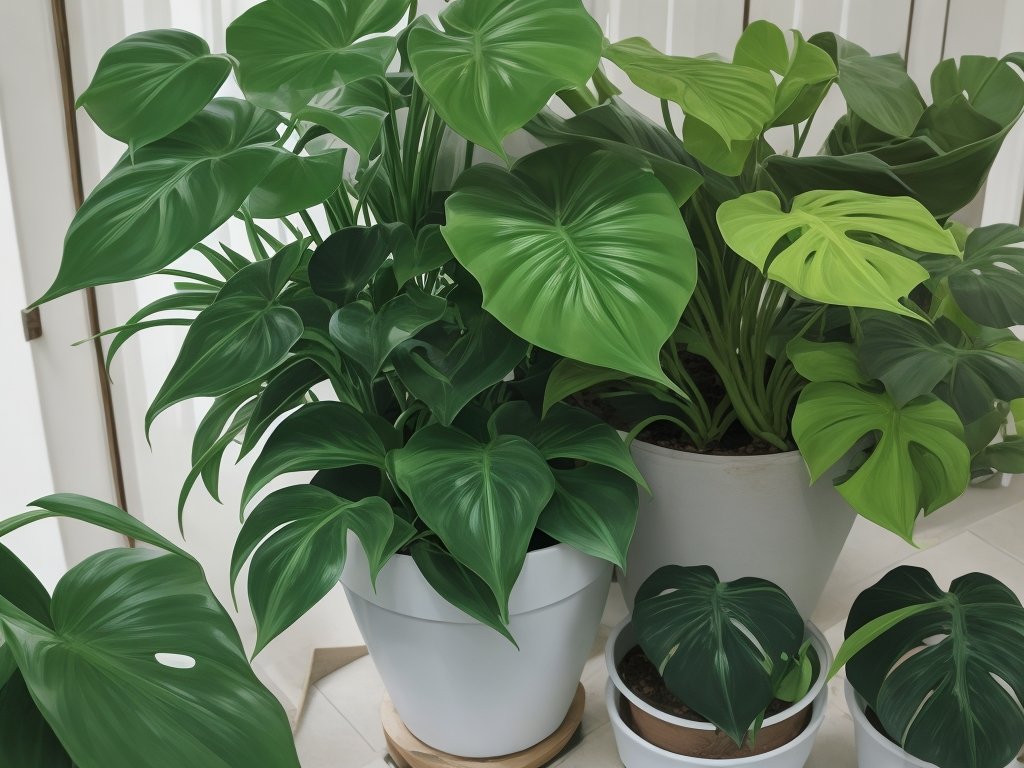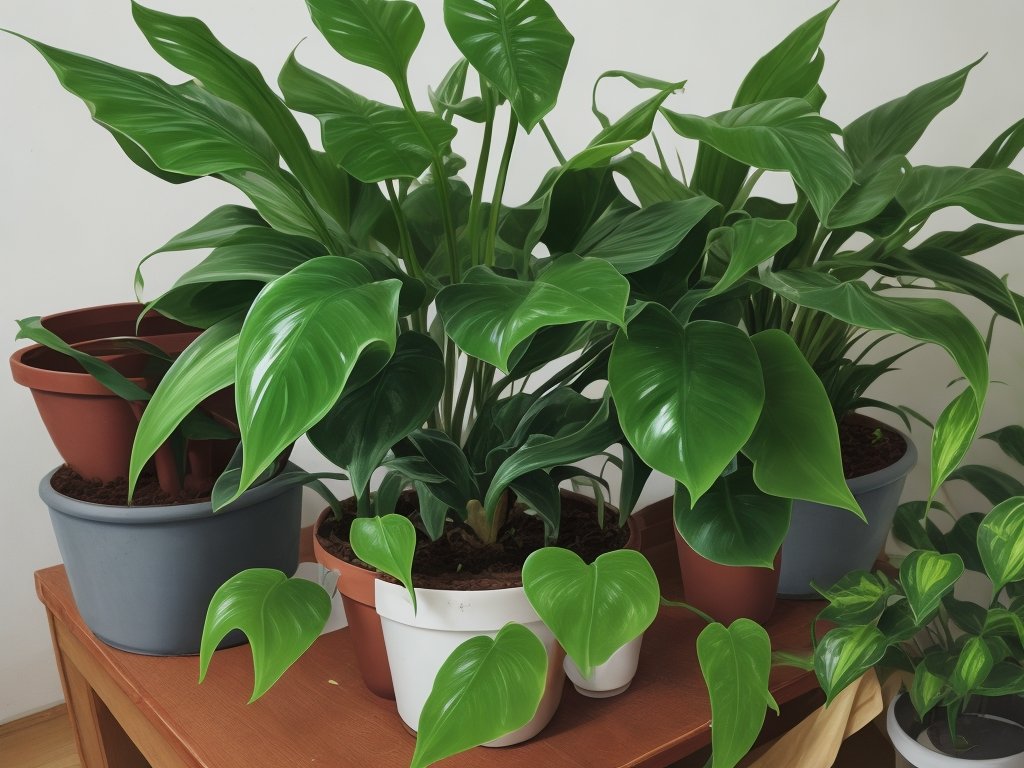Philodendron Health Benefits: Discover the Natural Wonder!
Key Takeaways:
- Philodendron plants can improve indoor air quality by reducing levels of harmful pollutants.
- Philodendrons have been found to have stress-reducing effects, promoting a sense of calm and relaxation.
- The leaves of Philodendron plants contain compounds that may have antioxidant and anti-inflammatory properties.
- Philodendron plants are low-maintenance and can thrive in various indoor environments, making them a popular choice for indoor gardening.
Welcome to the fascinating world of Philodendron plants! Have you ever wondered if these lush green beauties offer more than just aesthetic appeal?
Well, you’re in for a treat because today we’ll be exploring the incredible health benefits of Philodendron.
From improving indoor air quality to boosting respiratory health, enhancing mental well-being, promoting healthy skin, and aiding digestion, Philodendron has much to offer.
So, if you’re ready to unlock the secrets of this tropical wonder, keep reading! But before we dive in, let’s learn a little more about what exactly Philodendron is.
| Health Benefit | Description |
| Improved Air Quality | Philodendrons are known for their ability to remove pollutants from the air, helping to improve air quality and reduce respiratory issues. |
| Stress Relief | Being around greenery has been shown to reduce stress and promote relaxation. Philodendrons can contribute to a calming atmosphere. |
| Boosted Mood | Interacting with nature and houseplants like philodendrons has been linked to improved mood and overall well-being. |
| Increased Productivity | Studies have suggested that having plants in the workspace, including philodendrons, can enhance productivity and focus. |
| Natural Humidifier | Philodendrons release moisture into the air through a process called transpiration, which can help maintain humidity levels indoors. |
| Reduced Allergies | Contrary to some plants that may trigger allergies, philodendrons are generally considered hypoallergenic and can even improve symptoms for some individuals. |
What is Philodendron?
Philodendron is a popular houseplant known for its attractive foliage and easy care requirements.
Different types of Philodendron
There are several different types of Philodendron plants, each with their own unique characteristics.
iconic Swiss cheese-like foliagehe Heartleaf Philodendron, which has heart-shaped leaves, the Split-Leaf Philodendron, known for its large, deeply lobed leaves, and the Monstera Deliciosa, with its iconic Swiss cheese-like foliage.
Other types include the Xanadu Philodendron, the Brasil Philodendron, and the Velvet Leaf Philodendron.
Each of these varieties adds beauty and greenery to any indoor space.

Understanding the Health Benefits of Philodendron
Philodendron offers a range of potential health benefits.
Let’s explore them in detail.
Nutritional value of Philodendron
Philodendron plants, while known for their beauty, don’t offer significant nutritional value.
They are low in calories, fiber, and protein.
However, they do contain small amounts of vitamins A and C, as well as minerals like calcium and iron.
So, while they may not be a substantial source of nutrients, they can still contribute to a balanced diet.
Overview of the potential health benefits of Philodendron
Philodendron is a tropical plant that not only adds beauty to your space but also offers potential health benefits.
Some of these benefits include:
- Air purification: Philodendron has the ability to remove toxins such as formaldehyde and benzene from the air, improving indoor air quality.
- Respiratory health: Studies suggest that Philodendron may help reduce symptoms of respiratory conditions like asthma and allergies, thanks to its ability to remove airborne irritants.
- Mental health: Being around plants, including Philodendron, can help reduce stress, boost mood, and improve overall well-being. It creates a calming and soothing environment.
- Skin health: Philodendron extract has shown promising results in improving certain skin conditions, such as inflammation and acne, when used in skincare products.
- Digestive health: Consuming Philodendron leaves in moderation may aid digestion and promote regular bowel movements due to their fiber content.

Philodendron as an Air Purifier
Philodendron plants can help improve indoor air quality as they act as natural air purifiers.
How Philodendron helps improve indoor air quality
Philodendron plants help improve indoor air quality by effectively removing harmful pollutants and toxins from the air. They have the ability to filter out substances such as formaldehyde, benzene, and trichloroethylene, which are commonly found in household products and materials.
Additionally, Philodendron plants release oxygen and increase humidity, creating a healthier and more comfortable environment.

The specific air pollutants Philodendron can remove
Philodendron plants have the ability to remove certain air pollutants, making them effective natural air purifiers.
Some of the specific air pollutants that Philodendron can remove include formaldehyde, benzene, xylene, toluene, and trichloroethylene.
These pollutants are commonly found in indoor environments, and Philodendron plants can help to improve indoor air quality by absorbing and detoxifying them.
Philodendron and Respiratory Health
Philodendron can have positive effects on respiratory health.
Research supports the use of Philodendron for improving respiratory conditions.
The role of Philodendron in reducing symptoms of respiratory conditions
Philodendron plants have been found to help reduce symptoms of respiratory conditions. They do this by releasing moisture into the air, which can help alleviate dryness and irritation in the respiratory system.
Additionally, Philodendron plants can help remove toxins and pollutants from the air, promoting better air quality and potentially reducing respiratory symptoms such as coughing and wheezing.
Research suggests that having Philodendron plants in your indoor environment may help improve respiratory health.
Research evidence supporting the use of Philodendron for respiratory health
Research evidence suggests that Philodendron plants can be beneficial for respiratory health.
Studies have shown that Philodendron plants have the ability to remove toxins and pollutants from the air, creating a cleaner and healthier indoor environment.
Additionally, some research has also suggested that being around plants, including Philodendron, can improve airway function and reduce symptoms of respiratory conditions like asthma.
While more research is needed, these findings support the use of Philodendron for promoting better respiratory health.
Philodendron and Mental Health
Philodendron can positively impact mental health by reducing stress and improving mood. Research studies have provided evidence of the psychological benefits of having Philodendron plants in your environment.
Philodendron as a stress-reliever and mood enhancer
Philodendron can act as a stress-reliever and mood enhancer.
Research shows that being around plants, including Philodendron, can reduce stress and anxiety levels, promote feelings of calmness and relaxation, and improve overall mood.
Simply having a Philodendron plant in your space can create a soothing and positive environment.
Scientific studies on the psychological benefits of Philodendron
Scientific studies have shown that being around Philodendron plants can have psychological benefits.
These plants have been found to reduce stress and anxiety levels, improve mood, and enhance overall well-being.
The presence of greenery and nature indoors has a calming effect on the mind and can help create a peaceful and positive environment.
So having a Philodendron plant in your space can be beneficial for your mental health!
Philodendron and Skin Health
Philodendron can improve skin conditions due to its anti-inflammatory and antioxidant properties. Additionally, it is used in skincare products for its moisturizing and calming effects on the skin.
How Philodendron can improve skin conditions
Philodendron can improve skin conditions due to its antioxidant properties. These antioxidants help protect the skin from damage caused by free radicals, promoting healthier, more radiant skin.
Additionally, the plant’s anti-inflammatory properties can soothe irritated or inflamed skin, reducing redness and swelling.
Incorporating Philodendron into your skincare routine or using products infused with its extracts can help improve your skin’s overall health and appearance.
The use of Philodendron in skincare products
Philodendron is used in skincare products due to its potential benefits for the skin. It contains antioxidants that help protect against free radicals and reduce signs of aging.
Philodendron extract also has soothing and hydrating properties, making it beneficial for soothing irritated skin and promoting a healthy complexion.
Some skincare products use Philodendron extract as an ingredient to provide these benefits.
Philodendron and Digestive Health
Looking to improve your digestive health? Discover the potential benefits of incorporating Philodendron into your diet.
The digestive benefits of consuming Philodendron leaves
The consumption of Philodendron leaves may provide digestive benefits due to their high fiber content.
Fiber helps promote regular bowel movements, prevent constipation, and maintain a healthy digestive system.
Including Philodendron leaves in your diet can support overall digestive health.
Tips on incorporating Philodendron into your diet for better digestion
To incorporate Philodendron into your diet for better digestion, you can:
- Add Philodendron leaves to smoothies or juices for a nutrient boost.
- Use Philodendron leaves in salads or as a topping for your favorite dishes.
- Steep Philodendron leaves in hot water to make a refreshing herbal tea.
- Include Philodendron in cooked meals, like stir-fries or soups.
- Experiment with Philodendron recipes, like Philodendron leaf wraps or stuffed Philodendron leaves. Just make sure to cook them thoroughly for optimal digestion.
Potential Side Effects and Precautions of Philodendron
While Philodendron plants offer several health benefits, it is important to be aware of potential side effects and take precautions when handling them.
Allergic reactions and sensitivities to Philodendron
Some people may experience allergic reactions or sensitivities when exposed to Philodendron.
Symptoms can include skin irritation, rashes, itching, and respiratory issues such as coughing or difficulty breathing.
It is important to avoid direct contact with the plant if you are known to have allergies or sensitivities.
Safe usage and precautions for handling Philodendron plants
When handling Philodendron plants, it is important to take certain precautions to ensure your safety and the well-being of the plant. Here are some safe usage tips:
- Wash your hands: After handling Philodendron plants, make sure to wash your hands thoroughly to remove any potential allergens or irritants.
- Wear gloves: If you have sensitive skin or are prone to allergies, wearing gloves while handling Philodendron plants can provide an extra layer of protection.
- Keep out of reach of children and pets: Philodendron plants contain substances that can be toxic when ingested. Therefore, it is essential to keep them away from children and pets.
- Avoid direct contact with eyes and mouth: The sap of Philodendron plants can cause irritation if it comes into contact with sensitive areas like the eyes or mouth. Be cautious and avoid touching your face while handling the plant.
- Handle with care: Philodendron plants have delicate leaves and stems, so handle them gently to prevent any damage. Avoid pulling or yanking on the leaves, as this can harm the plant.
Frequently Asked Questions
Can Philodendron be toxic to pets?
Yes, Philodendron can be toxic to pets, including cats and dogs. The plant contains calcium oxalate crystals, which can cause irritation and swelling in the mouth, throat, and digestive system if ingested.
Symptoms may include drooling, vomiting, difficulty breathing, and decreased appetite.
It’s important to keep Philodendron plants out of reach of pets to ensure their safety.
How often should I water my Philodendron?
Water your Philodendron when the top inch of soil feels dry to the touch.
Overwatering can lead to root rot, so make sure the soil has a chance to dry out between waterings.
It’s better to underwater than to overwater, as Philodendrons can tolerate slight drought.
What are the best indoor conditions for Philodendron plants?
The best indoor conditions for Philodendron plants entail bright, indirect sunlight.
They thrive in temperatures between 65-75°F (18-24°C) and high humidity levels.
Keep the soil moist but not oversaturated, and ensure proper drainage.
Avoid exposing them to drafts or extreme temperature fluctuations.
Can I consume Philodendron leaves directly?
No, it is not recommended to consume Philodendron leaves directly. Philodendron contains oxalates, which can be toxic if ingested in large quantities.
It’s best to enjoy the health benefits of Philodendron through air purification or using skincare products that contain safe extracts from the plant.
Final Verdict
Philodendron plants offer a wide range of health benefits that make them a valuable addition to any indoor space. The nutritional value of Philodendron leaves, coupled with their ability to purify the air, support respiratory health, enhance mental well-being, improve skin conditions, and aid in digestion, make them a versatile and holistic natural remedy.
However, it is important to note that some individuals may experience allergic reactions to Philodendron, and precautions should be taken when handling the plants.
Overall, incorporating Philodendron into your environment and diet can contribute to a healthier and more vibrant lifestyle.







